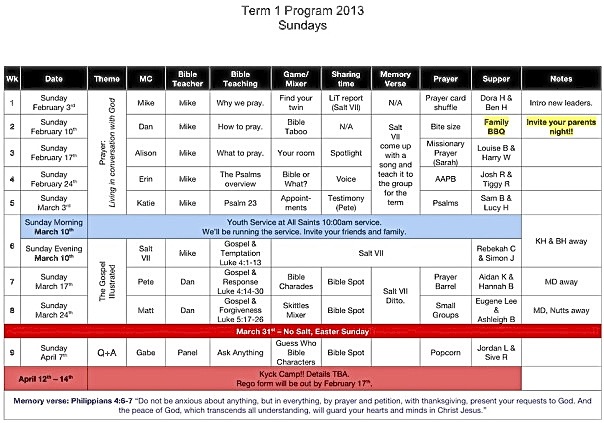Good youth groups need good planning!
Part 5 of 'How to start a youth ministry from scratch'.
(For the previous articles in this series, click on the links to the right.)
It can be quite an exhausting task coming up with a new youth group program for each school term of the year. It's even harder trying to be creative with how you run your youth group gathering so it remains fresh and yet faithful to your theology, values and principles. So here’s a few tools I use to make the process a little more simple, less exhausting and more sustainable.
We use this table (below) as the framework for each of our term programs. All the rows down the left represent the weeks and dates of the school term to be programmed. All the columns across the top represent the segments that make the weekly youth group gathering. The essentials are Bible Teaching and Prayer, but we have also added: Bible Game/Mixer, Sharing Time, Memory Verse, and Supper. We also sing with a youth group band at our group, but they have a separate calendar that goes along with the term program. The other columns, as you can see, are for things like teaching theme, special notes, and who’s doing what.

Keeping it regular
These regular segments at our regular youth group gathering mean there is an element of comfortable predictability for our young people as they come to youth group week after week, and yet because the segments are done with different activities each week and are arranged in a different order most weeks, there’s an exciting element of unpredictability that keeps it fresh. The advantage of this predictable structure is that young people know what they’re inviting their friends and gain confidence in the youth group gathering and what they can expect to happen when their friends are there.
How to put the program together
Here's how my process works:
- The term program really starts at the beginning of the year when I put together the year’s teaching program (2005-2012 examples here).
- Then at the start of each school term, I put the term program together by slotting in that term’s teaching program and filling out the rest of the table by inserting the various activities (view all segment activities here).
- In the Game/Mixer column I try to have a mix of Bible games and mixer games throughout the term so we’re doing activities that help us learn about God and each other throughout the whole term. Games/Mixers provide another layering of Bible teaching that is creative and enjoyable. Ultimately I try to pick activities for all the segments that will dovetail well with the teaching or create a good spread of variety over the term.
- Once the term program is complete, it is then up to the MC/host (one of the youth group leaders) to put together a running sheet of how those segments will be arranged for the gathering. He or she will nominate/ask other leaders to run those activities. All the leaders know what is expected of them at any given youth ministry gathering because of the “Leader Expectation & Leader Roles” documents here.
Using a running sheet
Below is an example of a running sheet for week 1 using the above example term program (you can download the running sheet template as a Word document here). You can see how the various segments have been arranged and delegated to different leaders. Each segment has the description of how it’s run, so everyone knows what they’re doing and when.

Extra information
You’ll notice there are other elements in my example term program and running sheet which I haven’t described. We’ll get to these later when we talk about how to include young people in serving at your youth ministry, and how to partner with parents and families as they raise their children in the Christian faith.
These tools are not meant to be rigid expressions of what a regular youth group must be like but a helpful tool in getting yourself started off in a good direction.







